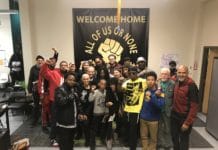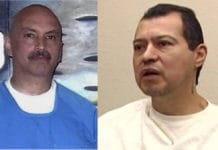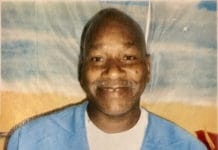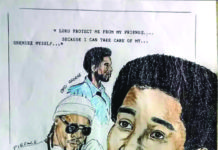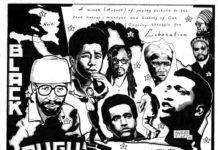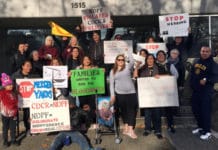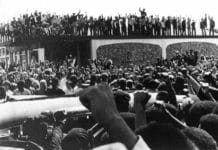A discussion on the Agreement to End Hostilities as a basis for socio-economic empowerment and inter-communal independence
by the NARN Collective Think Tank, Corcoran SHU
“To overcome the intelligent by folly is contrary to the natural order of things; to overcome the foolish by intelligence is in accordance with this natural order. To overcome the intelligent by intelligence, however, is a matter of opportunity.” – Zhuge Liang
Greetings, brothers and sisters. On Aug. 12, 2012, the Pelican Bay D-Short Corridor Collective issued the historic Agreement to End Hostilities (AEH) in all prison and juvenile facilities and called for its extension to our communities. The strategic and material benefits for our ongoing human rights struggle, thousands of prisoners and their families, is obvious.

In a recent “60 Minutes” exposé, a New Jersey state trooper and former Iraq and Afghanistan occupation force veteran began employing counter-insurgency techniques imported from those Middle Eastern battlefields to “clear and hold” poverty-stricken communities in New Jersey.
As we watched this program, they employed every strategy from quantification of tattoo ID and inter-communal violence data to “winning the hearts and minds” of residents in order to increase informants amongst the population. The increase in arrests and convictions which followed came as no great surprise, nor did the corresponding imprisonment that followed.
The lamentable economic condition of the state and this community, in particular, was noted at the outset of the “60 Minutes” story. But only a passing reference was made to potential economic development opportunities that had any hope of empowering that community and those who lived in it.
The potential benefit to our interests collectively is as equally vital as the abolition of domestic torture units and mass incarceration as a whole. In fact, it may serve as a new front in that struggle.
One of the prevailing factors that prompted this further militarization of law enforcement was the alleged violence between and that surrounding the local drug trade, knowing full well these phenomena are structural aspects of the capitalist arrangement that forces many in those communities to form or join street tribes for social empowerment or enter the underground economy as a survival activity.
This new counterinsurgency-inspired approach is just the latest tactic to win public support for yet another streamlining of the school-and-poor-community-to-prison pipeline and expansion of the prison industrial complex (PIC). But the NARN Collective Think Tank (NCTT) is not simply an analytical body. It is an analytical body whose goal is to provide practical solutions to society’s ills.

We thought: Would such repressive and authoritarian state measures be justifiable if an effective AEH was in place? Furthermore, if there were community-owned and operated economic ventures, educational development initiatives and socio-political empowerment platforms inclusive of and beneficial to everyone in the community, would there even be a need for the residents to sell dope or ride on one another?
If our communities were self-sufficient, politically empowered and markedly less violent, would that not translate into fewer of our brothers, sisters and children being exposed to the prospect of imprisonment and our communities being subjected to the militaristic occupation tactics of the state? It is our contention that the potential exists for this and much, much more.
The capitalist arrangement forces many in those communities to form or join street tribes for social empowerment or enter the underground economy as a survival activity.
The violence and rebellion against private property and bourgeois “law” that accompany the desperation of poverty and social alienation have long been the foundations for justifying the introduction and passage of Draconian laws and Gestapo-style enforcement tactics in depressed communities.
If our communities were self-sufficient, politically empowered and markedly less violent, would that not translate into fewer of our brothers, sisters and children being exposed to the prospect of imprisonment and our communities being subjected to the militaristic occupation tactics of the state?
We can assure you, the NYPD is not pushing “stop and frisk” on the denizens of the Upper East Side. These self-fulfilling prophesies of underdevelopment have decimated entire generations of young men and women, consigning them to the maw of the PIC. The threat of violence has also been utilized as the chief cornerstone in the state’s justification for the maintenance and expansion of Security Housing Unit (SHU) torture units. It is the very basis of the “worst of the worst” propaganda that CDCR continues to spout.

It is a crime to be poor in America. From the indentured servitude and pauper’s prisons of the 18th and 19th century to the array of criminalization measures used today – “gang injunctions” prohibiting citizens from congregating with their own friends and neighbors, “stop and frisk” powers which legalize profiling and mandatory drug testing for recipients of public financial aid, the ugly essence of criminal presupposition – the capitalist state has always sought to criminalize the poor.
The AEH, designed to preserve and expand the solidarity of our prisoner human rights struggle, has also had the objective effect of further undermining the state’s untenable position by taking that argument away from them.
The AEH can alter the historic dynamic by providing our communities with an environment in which to restructure our socio-economic reality and common ground upon which to pursue mutually beneficial cooperative efforts, independent of the hostile, antagonistic state and its modern predatory capitalism. But how would that look on the ground? To answer that question, the NCTT discussed the validity and practical application of such an undertaking in relation to the realities on the ground.
The capitalist state has always sought to criminalize the poor.
Using the Agreement to End Hostilities to bring peace and prosperity to the hood
The final interpretation of that analysis led us to two basic conclusions: First, many of our younger brothers and sisters are so embroiled in these cycles of violence and retribution that if the AEH were embraced en masse beyond the walls, not only would it require a productive program of genuine material benefit to act as an incentive and fill the void previously occupied with negative activities, but secondly, we’d also need principled and respected soldiers on the ground to mitigate misunderstandings. The remainder of this discussion will thus be a direct outgrowth of these two primary prerequisites.
The NCTT-COR-SHU has previously articulated three pilot programs within the context of comprehensive community development and social transformation. More information on the NCTT three pilot programs is available at ncttcorshu.org and sfbayview.com under “A Discussion on Strategy for the National Occupy Movement.”

We took the time to explore the viability of these ideas by engaging those right here in this torture unit, the Corcoran SHU, from every cultural group on whether this would be something their homies and communities would be interested in. If brothers and sisters didn’t have to worry about getting set-tripped on or having to ride on cats that rode on their homies, would they be interested in pursuing and working in community-owned businesses and agricultural communes that kept all the funds, fruits and employment in their community?
Prison industrialists, corporations and politicians are consistently drafting laws to criminalize our daily lives and cultures. Would our brothers and sisters be interested in organizing their families, homies and home girls without felony records into voting blocks and lobbying bodies to push legislation that benefited their interests – abolishing the slavery provision of the 13th Amendment that precludes those convicted of a felony from voting, creating community-based parole boards so that their loved ones could finally get a date, or abolishing “gang injunctions” that criminalize associating with friends and neighbors you’ve grown up with all your life?
Mutually-enforced Agreement To End Hostilities (AEH), can give us the tools to reclaim our own communities from police state occupation, rebuild them into bastions of collective prosperity and shared success, while denying the PIC and the capitalist state the opportunity to exploit our young homies, g-homies, comrades and the intra-class/race contradictions we’ve had to endure under this corrupt system of divide and rule.
We held these conversations with young and old alike, from every cultural group and affiliation, and the response was universally positive. Some had never even viewed these concepts as a possibility, but by the wisdom of the Pelican Bay D-Short Corridor Collective, the AEH has given rise to possibilities previously unimaginable.
Extending the Agreement to End Hostilities to the streets as a basis upon which to build an independent economy, our own self-sustaining agriculture and organized political power will ensure our communities and loved ones are no longer a marginalized segment of the population, preyed upon to fuel the PIC.
It is our contention that a concerted effort by all cultural groups and affiliations to extend the AEH to all communities in society where we have influence, coupled with designating specific, personally respected and reputable soldiers to ensure the AEH is understood and adhered to by their communities, would give us both the social climate and manpower to organize effective closed-circuit economic initiatives, sustainable agricultural communes and block-vote democratic initiatives.

Empower our youth: Each one teach one
There is even more opportunity for us here, brothers and sisters. One of the universal complaints of responsibly thinking soldiers from all cultural groups is that our young brothers and sisters are receiving no meaningful development and left to the tender mercies of the U.S. capitalist counter-culture of predatory greed and reactionary violence.
The youth are emulating the irrationality inherent in the poor and powerless preying on the poor and powerless as a path to power and prosperity. This is not to castigate the quality of our young soldiers but to acknowledge structural setbacks in orientation and development.
Those who follow the “each one, teach one” tradition are, to a great degree, isolated in prisons and SHUs, or they have turned their backs on the community completely for upward class mobility. There is even an unsavory segment who actually take advantage of this situation of uneven development for their own selfish gain. In either regard, all of us can agree that increasing the quality of young men and women being developed in our communities will empower us all, further improve the problem-solving skills of our young brothers and sisters and improve the quality of life for all our people.

Phase I involves a five times per week, two and a half hour after school educational and training initiative that focuses on history from the true perspective – think Howard Zinn, Cheikh Anta Diop and Dela Vales: cultural awareness to retard racial conflicts and strife between oppressed nationalities stemming from stereotypes and misconceptions of Asian, New Afrikan, Mexican/Latino, Euro-American and Middle Eastern cultures and more; computer and technological literacy; the arts – visual, music, dance etc.; and science and engineering.
Three out of every five days each week, the final hour will be devoted to martial arts, self-defense training and strategic thought to promote self-discipline and critical thinking. Participants must comply with participation in Phase I to be eligible for Phase II.
Phase II involves establishing a collectively-owned, community-based venture. Each youth participant will own an equal stake and be trained in the area of the venture which best suits them. All will receive equal revenue portions – or pay – to demonstrate collective work and responsibility and an equalitarian distribution of wealth.
Perhaps one of the more enjoyable commonalities shared by all the cultural groups engaged in the AEH is a fondness for the custom-car cultures. Building on the intra-cultural commonality, the pilot venture can be a custom-car garage – think “Pimp My Ride” – where we can seek tax deductible, in-kind donations of equipment and old cars, cash donations and fundraiser revenues.
Volunteers from this industry will train such youngsters in exchange for marketing publicity for their own ventures while we also seek industry-related sponsors. The cars will be retrofitted, rebuilt and “pimped out” into custom low riders, “donks” and euro-tunes, then put on the lot for sale and website auction. Fifty percent of the profit proceeds from each sale or client “fix-up” will be split equally among the youth, 20 percent will go to expand the nonprofit initiative, 20 percent will go to a college fund for youth participants and 10 percent will flow back into expanding the venture.

The positive social impact on our communities for our people who live in these communities should be significant. But equally impactful is that all this progress would originate with the AEH, and the AEH originated from prisoners in the SHU – the Pelican Bay D-Short Corridor Collective, to be precise.
Can you all imagine the political success for our movement to abolish indefinite SHU confinement which would grow from such irrefutably positive public opinion? In the face of such success we would eradicate the myth that we are “the worst of the worst” while exposing the intentional underdevelopment and predatory law enforcement practices of a capitalist state which has effectively dehumanized our communities, our families, our very children.
To the capitalists, we are mere commodities
Central to understanding and responding to our indefinite torture as validated SHU prisoners and to human misery endemic of the underclass communities that the majority of us come from is understanding the nature and structure of U.S. capitalism and our relationship to the productive system. The fact that we are holding this discussion with you from a SHU, where underclass men and women are virtually the entire prison population, is the best proof that the relationship between our communities and the ruling class of the productive system is a hostile one.
We seek to wrest power sufficient to reclaim our humanity and enforce our dignity in the arenas of social life, while they in turn are disinclined to relinquish their authority to dehumanize and exploit us. As long as we are bound by the paradigm of the dominant culture, functioning within the labyrinth of our own exploitation by a socio-economic structure which institutionally disfavors both our communities and ourselves, regardless of cultural character, the cycle of torture and misery will continue.
What must be understood is that the small social forces which have deemed our communities “high crime areas” and SHU prisoners “the worst of the worst” are the same social forces that have reduced the social ties between people to promote self-interest and cause back payment. These same forces have transformed personal worth into mere exchange value and subordinate countless of our hard-won freedoms to their one and only freedom, the freedom of “fair trade.”
We are mere commodities to them, piles of human flesh they can use to expropriate a specific annual amount of the social product via taxes depending on where they warehouse our flesh – general population (GP), SHU, administrative segregation (Ad Seg) etc. Our exchange value is tabulated by prison industrial labor aristocrats, the California Correctional Peace Officers Association (CCPOA), administrators and corporate interests to determine exactly how they need to manipulate public opinion and the electorate to maintain their privilege.
These same forces have transformed personal worth into mere exchange value and subordinate countless of our hard-won freedoms to their one and only freedom, the freedom of “fair trade.”

We have the opportunity to forge a new socio-economic and political paradigm which is structured outside the confines of the dominant culture and definitely serves the interests of our communities, our families, us. The only question is do we collectively possess the political will to carry the AEH to its logical and victorious conclusion? This is all theoretical, a discussion designed to promote and inspire a glimpse of one possible future and encourage us all to consider it.
We have a chance to not only change our communities for the better, but to definitively turn public opinion in our favor in the protracted struggle to abolish the domestic torture units SHU prisoners are condemned to endure. No matter where this discussion leads, the very foundation of the premise would not exist if not for the wisdom of the Pelican Bay D-Short Corridor Collective in enacting the Agreement to End Hostilities (AEH). We all, and society as a whole, owe them our thanks. Think on these things. They are cause for great meditation.
We have a chance to not only change our communities for the better, but to definitively turn public opinion in our favor in the protracted struggle to abolish the domestic torture units SHU prisoners are condemned to endure.
For more info on the NCTT-COR-SHU or its work product, go to ncttcorshu.org or contact Zaharibu Dorrough, D-80611, CSP-Cor-SHU, 4B1L-43, P.O. Box 3481, Corcoran, CA 93212; J. Heshima Denham, J-38283, CSP-Cor-SHU, 4B1l-43, P.O. Box 3481, Corcoran, CA 93212; Kambui Robinson, C-82830, CSP-Cor-SHU, 4B1L-49, P.O. Box 3481, Corcoran, CA 93212; Jabari Scott, H-30356, CSP-Cor-SHU, 4B1L-49, P.O. Box 3481, Corcoran, CA 93212.

 Store
Store



